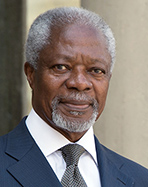

Kofi A. Annan and Kishore Mahbubani
Today, the United Nations Security Council has more sanctions regimes in place than at any time in its history. During the 1990s, the maximum was eight; in the 2000s, the peak rose to 12; now it stands at 16. And these totals do not include sanctions imposed by the European Union and the United States. Judging by this escalation, one might conclude that sanctions have proved a remarkably effective tool in promoting international peace and security. Unfortunately, that is far from being the case.
In fact, academic studies suggest that sanctions have had limited success. Thomas Biersteker of the Graduate Institute in Geneva estimates that sanctions are effective only about 20% of the time. According to Oxford University’s Adam Roberts, “There are very few cases where you can definitely identify sanctions as having had a success, except sometimes in combination with other factors.” For example, while US and EU sanctions on Myanmar may have contributed to the country’s decision to open up its economy and engage in gradual political reform, fear of becoming overly reliant on China may have been a bigger consideration.
But the potential problems with sanctions regimes extend far beyond ineffectiveness. There is also evidence that sanctions can be counterproductive, such as when targeted regimes enrich themselves by controlling black markets in prohibited goods. In Haiti, to take just one example, the military regime facilitated the trade of black-market oil across its border with the Dominican Republic during the oil embargo on the country in 1993 and 1994.
The article’s full-text is available here.











